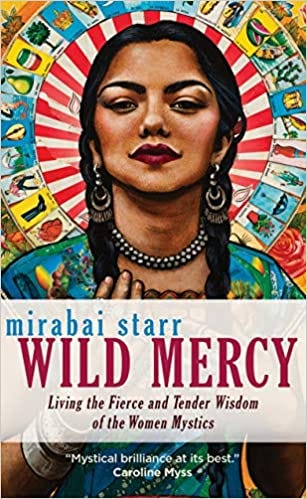Mary's Legacy
The Divine Feminine, Amy Jill Levine, Christ in Evolution and A Prayer for Humility
Us Protestants have an odd relationship with Mary, Jesus’ mother. We were taught that Catholics prayed to her and that that was idolatry. We were so afraid of “idol worship” and the deification of Mary, that we kind of just tossed her to the side. We pull her out once a year to talk about submission and obedience and the miracle of virginity. Sometimes we get progressive and talk about how strong she must have been… to have been so obedient. (Blargh) But to be fair we tossed a lot of women to the side. Mary Magdalene, the apostle to the apostles, was not only tossed aside but slandered a prostitute as well. Virgin. Whore. Such easy ways to categorize, mythologize and dehumanize women.
Growing up in Evangelical culture, my idea of the Divine Feminine was pretty much Dana Carvey as his formidable “Church Lady.” I exaggerate. I knew a lot of wonderful women. I just didn’t see myself in many of them.
A few years ago I did a retreat at Gravity Center in Omaha with Mirabai Starr, the brilliant author, translator and wisdom teacher. The retreat’s theme was on The Divine Feminine where Mirabai read and taught from her new book Wild Mercy: Living the Fierce and Tender Wisdom of the Women Mystics.
It was a revolutionary retreat that expanded my woefully limited understanding not only of the Divine Feminine but of the intensely beautiful feminine mystics through the ages. St. Teresa of Avila, the Shekinah, Kwan Yin, Mary Magdalene to just name a few. The portraits of the women she painted looked nothing like the Church Lady.
“Many of the women mystics we have been exploring here chose to be pilgrims rather than wives, and they had to fight against a prodigious tide in resisting society’s expectations and dedicating their lives to prayer. Sometimes their only option for cultivating a spiritual life was to become a nun, even if their inner experience and temperament rendered them unsuited for monasticism.”
According to the teachings of these women mystics, the feminine nature of God is not that of a tight lipped, pious casserole creator, but the nature of a Mother, a Lover, an Activist and Artist; the spirit that cultivates contemplation and works according to a fierce and wild mercy. This was some femininity that I could get behind.
I wrote a paper in my Biblical Interpretation class in seminary that I continue to work on. It’s called The Feminine Narrative: Stories of Wells, Wombs and Tombs. The thesis is that there is actually a feminine narrative woven into the arc of the Bible in spite of the Bible being written, curated and interpreted within a world dominated by patriarchy. In spite of the limitations of culture, the Divine Feminine presents Herself. In the Hebrew scriptures, God is described as a mother, midwife and even as a wet nurse. So it makes sense that Mary is very much the particular manifestation of the Divine Feminine. We learn about who God is by watching Mary’s example of letting go in her response to the angel “let it be,” in making space for divine creation, and in her relentless acceptance of the radical evolution of thought her son was bringing forth. A letting go, a making space and a commitment to radical evolution. Yup. Sounds good to me.
Who I’m Reading:
In that same Biblical Interp class I read a lot of Amy Jill Levine feminist biblical commentary. Dr. Levine is a New Testament scholar that teaches at Vanderbilt’s Divinity School. In her bio she describes herself as a,"Yankee Jewish feminist who teaches in a predominantly Protestant divinity school in the buckle of the Bible Belt," who "combines historical-critical rigor, literary-critical sensitivity, and a frequent dash of humor with a commitment to eliminating antisemitic, sexist, and homophobic theologies."

Check out her interview on one of my favorite podcasts.
I’m interested in reading her new book, The Bible With and Without Jesus: How Jews and Christians Read the Same Stories Differently. Here’s a new book review : ‘Lo, a virgin shall conceive’ … or not, depending on the translation
Speaking of “radical evolution,” the second woman who is a must for your reading list is Ilia Delio, OSF. Delio is a Franciscan nun with doctoral degrees in both theology and science and her prodigious writing is bursting with intellectual and spiritual feasts.
But Delio insists that her message really is quite simple.
"I want everyone to see that we are loved into being at this moment just as we are by a God of unconditional love," Delio says.
"We emerge out of this long, cosmic process we call evolution. But evolution is about deep relationality," she continues. "We are created for love, and that's what keeps pulling us onward."
(from National Catholic Reporter’s The Evolution of Ilia Delio)
I’m working my way through Christ in Evolution which is a stunning book that explores these themes of Christology and the teleology of the material and mystical universe.
The thing I love about both of these women is that they look through their individual lens to bring seemingly disparate ideas together into unity. Levine’s Judaism becomes a much needed lens from which to look at New Testament scholarship and Delio’s lenses of both science and religion don’t dilute but rather create patterns of truth that only support and give depth and breadth to one another. And look what happens when women move beyond writing bible studies for other women. Just sayin.
Lastly, back to the manger. But, actually.
Two weeks ago I recommended Rob’s album, William the Angel as one of my all time favorite Christmas albums. I’ve listened to it a lot these last few weeks and I keep going back to this song and listening over and over. Seems like the perfect prayer for our nation right now. A prayer for simplicity, kindness, mercy and humility.
Swing down from wherever you are, Angels,
And pay attention to every prayer. There are so many flying through the air.
Come down from the highest of heights, Spirit,
And once again lend us your ear.
Swing down from the heavenly pasture,
Swing down from the fruitful plain,
Swing down to the certain disaster
Cover the fields of peaceful grain.
Bring this world back.
Gather us together.
Bring this world back.
Back the manger.
Look here what they do in his name, Angels,
I’ve been wondering too long just to
know where we went wrong?
Bring this world back.
Gather us together.
Bring this world back
Back to the simplicity,
Back to the kindness,
Back to the mercy,
Back to the humility.
Back to the manger, again.







